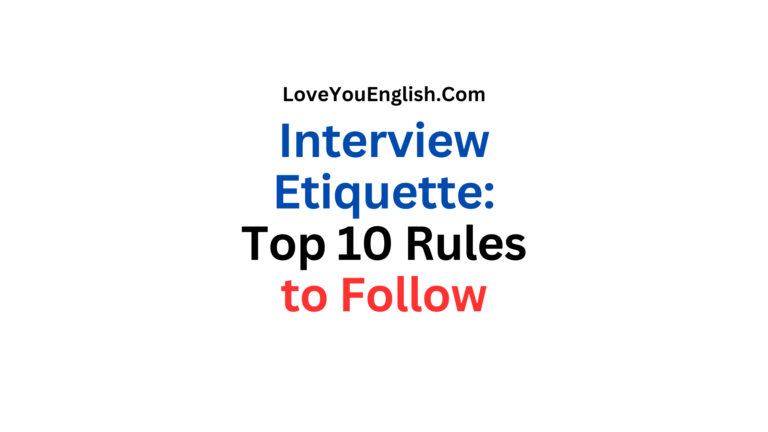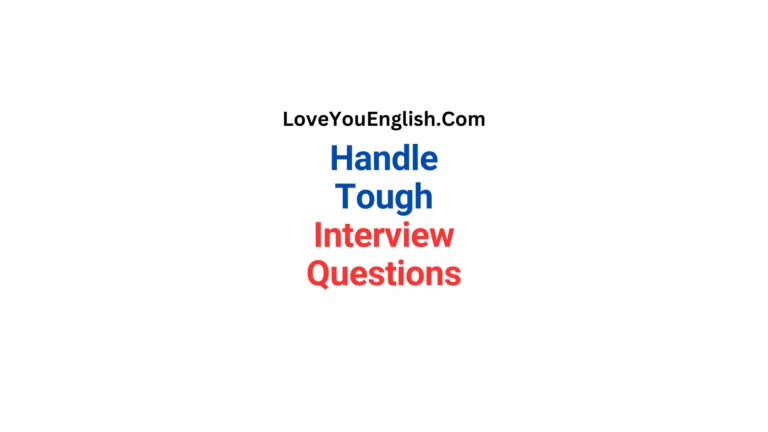Phone Interview Tips to Get You to the Next Round
Phone interviews have become a common way for employers to screen job candidates. They offer a convenient and efficient way to assess potential hires before inviting them for an in-person interview. However, unlike face-to-face interviews, phone interviews come with their own set of challenges. Without the visual connection, it’s easy to feel disconnected, but making a great first impression over the phone is possible.
In this post, I will discuss some practical tips to help you shine in a phone interview.
1. Prepare in Advance
Preparation is key to any successful interview, and this is especially true for phone interviews. Before the interview, take some time to gather all the materials you need.
- Research the company: Understand the company’s mission, values, products, and services. Being able to speak about the company will show the interviewer that you’re genuinely interested in the position.
- Know the job description: Read the job description carefully and match your skills to the requirements. This will help you answer questions more confidently.
- Prepare your resume and notes: Keep your resume, the job description, and any notes in front of you. This way, you won’t have to search for information during the interview.
The more prepared you are, the more confident you’ll sound, which will create a positive impression on the interviewer.
2. Find a Quiet Place
The environment where you take the phone interview is extremely important. You don’t want to be distracted by noise or interruptions. Find a quiet, comfortable space where you can speak clearly and focus fully on the conversation.
- Turn off background noise: Close windows, doors, and anything else that may create noise. If you’re in a shared space, use a room where others know not to interrupt.
- Avoid distractions: Keep your phone on silent mode, and close any apps or tabs on your computer that may distract you during the call.
- Have a good phone signal: Poor reception or constant call drops can make the conversation frustrating. Ensure you have a strong signal or use a landline if possible.
By ensuring a quiet environment, you’ll be able to communicate clearly, which is key in a phone interview where tone and words matter more than ever.
3. Speak Clearly and Slowly
Since the interviewer can’t see your facial expressions or body language, they rely heavily on the sound of your voice to judge your communication skills. Speaking too quickly or too softly can make it hard for the interviewer to understand you.
- Speak clearly and at a moderate pace: Avoid speaking too fast, which can make you sound nervous or unclear. Instead, take your time to explain your answers.
- Enunciate your words: Make sure every word is pronounced clearly so the interviewer can follow your responses.
- Be mindful of your tone: A friendly and upbeat tone will make you sound more engaged and enthusiastic about the role.
The goal is to communicate effectively, so take your time and be mindful of how you come across.
4. Be Confident, But Not Overly Confident
Confidence is an important trait to show in a phone interview, but it’s essential not to sound arrogant. Employers want to hire someone who is both skilled and humble.
- Speak with confidence: Believe in your abilities and experience. When you talk about your skills and achievements, do it in a way that shows you’re proud of your work without bragging.
- Avoid sounding too casual: It’s important to strike a balance between being friendly and professional. Don’t overdo it with humor or informal language.
The interviewer is looking for someone who is self-assured and professional. By staying confident but humble, you’ll leave a positive impression.
5. Listen Carefully
Listening is just as important as speaking in a phone interview. You may not always hear everything clearly, and sometimes interviewers will give you hints about what they want to hear.
- Don’t interrupt: Let the interviewer finish speaking before you respond. Interrupting can make you seem impatient or disrespectful.
- Ask for clarification: If you didn’t understand a question, don’t hesitate to ask the interviewer to repeat it. It’s better to ask for clarification than to give a wrong answer.
- Take notes: Jot down key points during the conversation so you can refer back to them when needed. This shows you’re paying attention and will help you remember important details.
By listening carefully, you show respect for the interviewer and make sure you’re answering the right questions.
6. Use a Notepad to Organize Your Thoughts
In a phone interview, it can be harder to stay organized because you can’t see the interviewer’s body language or follow a visual agenda. Having a notepad in front of you can help you stay on track.
- Write down key points: Before the interview, jot down important details like the company’s name, the job title, and a list of your strengths. This will help you stay focused during the conversation.
- Keep a list of questions to ask: Towards the end of the interview, the interviewer will likely ask if you have any questions. Prepare some thoughtful questions to show your interest in the company and the role.
Having a notepad can also help you stay calm because you’ll feel prepared and organized.
7. Practice Answering Common Interview Questions
While every interview is different, certain questions come up in almost every interview. Practicing your answers to these questions will make you feel more confident.
- Tell me about yourself.
- Why do you want to work here?
- What are your strengths and weaknesses?
- Why did you leave your last job?
- Where do you see yourself in 5 years?
Practice answering these questions out loud, as this will help you get comfortable speaking about yourself and your experiences.
8. Be Ready for Technical Difficulties
Technical issues can happen, especially in phone interviews. Whether it’s a poor signal or a call drop, it’s important to stay calm and handle the situation professionally.
- Stay calm: If the call drops or there’s an issue with the connection, remain calm. Politely ask the interviewer if they can call you back, or you can try calling them.
- Be flexible: If there’s a delay or issue, don’t get frustrated. Stay professional, and offer a solution if needed.
Technical difficulties are part of the process, and how you handle them can show the interviewer your problem-solving skills.
9. Follow-Up After the Interview
After the phone interview is over, don’t forget to send a follow-up email. This shows gratitude and reinforces your interest in the position.
- Send a thank-you note: In your email, thank the interviewer for their time and express your interest in the role. You can also briefly mention why you believe you’re a good fit for the job.
- Be polite: Keep your email brief and professional. Avoid making demands or asking for updates immediately.
Following up after the interview is a simple yet powerful way to show your professionalism and interest in the job.
10. Stay Positive and Enthusiastic
Finally, maintain a positive attitude throughout the interview. Employers are looking for candidates who are enthusiastic and motivated.
- Show excitement: Even though the conversation is over the phone, you can still express enthusiasm. Let the interviewer know you’re excited about the role and the opportunity to join their team.
- Stay positive about past experiences: If asked about past jobs or challenges, focus on the positive aspects and what you learned from them. Avoid speaking negatively about previous employers or coworkers.
A positive attitude can leave a lasting impression and make you stand out as a candidate who is not only qualified but also a joy to work with.
Conclusion
Phone interviews are an essential part of the hiring process. By preparing well, creating a quiet environment, and communicating clearly, you can make a strong first impression. Remember, confidence, professionalism, and enthusiasm are key. If you follow the tips in this post, you’ll be on your way to making a great first impression and moving forward in the hiring process.
Good luck!
Read more:
- Career Tips for Young Professionals
- CV vs. Résumé: What’s the Difference?
- Professional Development Goals
- Tips for Writing a Professional Email







